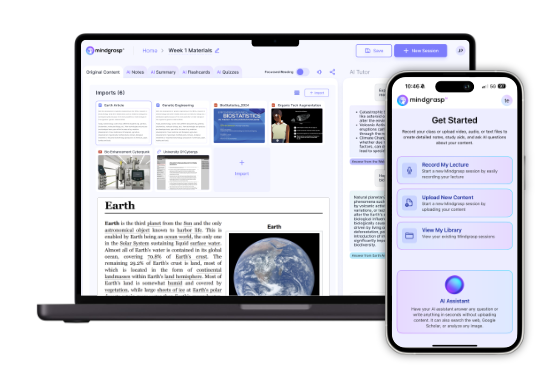
To cram for a literature exam, we need to work smarter, not harder.
Start by prioritizing key themes and characters instead of memorizing entire plots. Create flashcards for quotes and literary devices, then test yourself—don't just reread notes.
Use visual tools like concept maps to connect themes across texts, and practice writing timed essays. Don't forget short breaks and sleep!
Your study strategy matters more than the hours you put in.
Why cramming for literature feels harder than other classes
Unlike cramming for math or science, where formulas and facts can be memorized in a flash, literature exams feel like a special kind of torture.
We're not just remembering what happened in a book—we're analyzing themes, character arcs, and those pesky literary devices that your AP teacher loves to test.
When we're cramming, we're trying to juggle multiple texts and authors at once, plus develop meaningful interpretations (not just regurgitate facts). It's like trying to understand five different people's life stories in one night!
The most important thing to remember? Literature requires both memory work and analytical thinking—a tough combo when you're running on coffee and panic.
Practice articulating your thoughts—that's what'll save you when time's tight.
Boost Your GPA Faster with Mindgrasp
Instantly turn your class notes into smart summaries, flashcards, and quizzes—study less, learn more, and ace your exams.
Try it FreeStep 1: Determine what to study (Prioritize high-impact topics)
When facing a literature exam with limited time, your first battle is figuring out exactly what to study—not everything deserves equal attention!
Let's focus on how to prioritize high-impact topics that'll give you the most bang for your buck.
Start by checking past exams—they're gold mines for spotting patterns in what professors repeatedly test. Major characters and their relationships often show up, so don't skip those!
We recommend creating a simple list of:
- Key texts from your syllabus
- Critical themes that appear across multiple works
- Essential literary terms you'll need to sound intelligent
- Character developments that drive the plots
Step 2: Gather your literature materials and make a quick plan
Now that you've figured out what to focus on, it's time to round up all your study materials and create a battle plan! Collect everything you'll need for an effective review:
- Textbooks and class novels
- Your class notes (even those doodle-filled ones!)
- Study guides and handouts
- Past quizzes or tests (super helpful!)
Next, make a simple schedule that puts your highest-priority topics first. Break your cramming time into manageable chunks—nobody can focus for six hours straight!
Use flashcards for key quotes and characters, and group your notes by themes rather than chronologically.
Step 3: Use active recall to study literature (Don’t just re-read)
Simply re-reading your notes or skimming through your novel for the fifth time isn't going to cut it! If you want to actually remember those literary concepts when exam time hits, you need to engage in active recall techniques.
Here's what works better:
- Quiz yourself with flashcards on characters, themes, and literary devices
- Close your book and try summarizing the plot or character arcs from memory
- Explain key themes to a friend (or even your cat!) – teaching others reinforces your own understanding
- Make up practice essay questions and outline answers without peeking at notes
When we test ourselves, we're forcing our brains to retrieve information – and that's exactly what we'll need to do during the exam!
Step 4: Break down complex literature processes with diagrams
Literature can get pretty messy with all those intertwining plots, characters, and themes—so let's break it down visually! Concept maps are perfect for connecting characters and themes, while flowcharts help you track plot progression.
When studying, try these simple approaches:
- Use Venn diagrams to compare characters (super helpful for those essay questions on practice exams!)
- Create timelines for historical context—especially when the author's life influences their work
- Make graphic organizers for literary devices—they're lifesavers when you need to quickly recall examples
These visual tools transform complicated narratives into manageable chunks.
When we're cramming, our brains process pictures faster than text—so grab some colored pens and start mapping! You'll be amazed how quickly diagrams clarify what once seemed impossibly complex.
Step 5: Leverage AI study tools like Mindgrasp AI for literature
While traditional study methods have their place, modern technology offers powerful shortcuts for literature cramming—enter Mindgrasp AI.
We've found this tool to be a game-changer when you're pressed for time!
Try Mindgrasp for Free!
Experience an easier, faster way to boost your GPA. Sign up now to try Mindgrasp AI for free and see how AI-powered learning transforms your study routine.
Try it FreeMindgrasp AI can quickly summarize those lengthy novels, highlighting key themes and characters you need to know.
It'll even create a personalized study plan based on your learning style (a lifesaver if you're a visual learner tackling Dickens!).
Need to test yourself? The platform generates flashcards from your notes and provides instant feedback on practice essays—helping you fine-tune arguments before the big day.
Plus, its AI-powered annotations reveal those literary devices your professor loves to ask about.
Don't just read literature—let Mindgrasp AI help you understand it!
Step 6: Memorize key terms and definitions with flashcards & mnemonics
Once you've tapped into AI tools to grasp the big picture, it's time to nail down those specific literary terms that often make or break your exam grade. Creating flashcards is your secret weapon here!
We recommend making them extra effective by:
- Adding both definitions AND examples from texts you've studied
- Grouping related concepts together (like different types of metaphors)
- Including visual elements when possible (draw a quick sketch of personification!)
- Creating memorable mnemonics (remember "alliteration" with "Annie always ate apples")
Don't just make flashcards—use them regularly! Quiz yourself daily, even if just for 10 minutes.
The physical act of writing them helps cement the information, while regular review guarantees those terms stick in your memory when exam time arrives.
Step 7: Practice with questions and problems
After hours of studying themes and memorizing quotes, there's one essential step you can't skip — practicing with actual exam questions! Getting comfortable with the format and timing of questions is critical to your success.
Here's what we recommend:
- Find past exams or sample questions online
- Set a timer and write responses under exam conditions
- Join a study group to swap answers and get feedback
- Try explaining your analysis to others (it reveals gaps in understanding!)
Don't just read questions — actually write out full responses. This builds your confidence and helps you organize your thoughts quickly.
Step 8: Take short breaks and look after yourself
Now that you've got your practice routine down, let's talk about something that might seem counterintuitive – taking breaks!
Your brain needs rest to process all that Shakespeare and Austen you're cramming in.
Try the Pomodoro Technique – study intensely for 25-30 minutes, then reward yourself with a 5-minute break.
During these short breaks:
- Stand up and stretch or take a quick walk
- Drink water (your brain loves hydration!)
- Grab a healthy snack like nuts or fruit
- Do something completely different – look out the window or doodle
Cramming for literature in 1 Day, 3 Days, or 1 Week
Let's look at how to approach your lit exam based on the time you have left—whether it's a week, three days, or just 24 hours.
With a week to go, we can spread out our studying by tackling different works each day, making flashcards for quotes, and practicing timed essays.
If you've only got three days, we'll need to be more strategic—focusing on character arcs the first day, themes and motifs the second day, and practice essays on the final day.
For those of you in panic mode with just one day left, don't worry—focus only on the big stuff: key themes, major plot points, and central conflicts that are likely to appear on the exam.
Cramming for literature with one week left
With a full week before your literature exam, you're in a surprisingly good position to prepare effectively—even if you've fallen behind. This timeframe gives you ample opportunity to study for the AP or any other literature test with a structured approach.
Here's what to do:
- Create a daily schedule—dedicate 1-2 hours per day to each major text
- Make character flashcards for quick review
- Read SparkNotes summaries first, then explore important passages
- Form a study group to discuss themes and character motivations
- Practice writing timed essays on major themes
We recommend focusing on the big picture first—main characters, plot arcs, and recurring symbols—before drilling down into specific quotes or details.
Cramming for literature with three days left
Three days before your literature exam might sound like a crisis, but we're here to tell you it's actually plenty of time to prepare! At this point, forget reading entire novels—head straight for SparkNotes or CliffsNotes to grab those essential themes and character arcs.
Here's your high school lit cramming plan:
-
Day 1: Create chapter-by-theme flashcards with key quotes and literary devices
-
Day 2: Write timed practice essays (25 minutes each) to build speed
-
Day 3: Review your flashcards and organize your notes by theme
Remember to schedule specific hours for each text—maybe 3 hours per work.
And don't panic! Quick-reference notes will save you when you're trying to recall that perfect quote under exam pressure.
Cramming for literature with one day left (24 hours)
You've reached the final countdown—just 24 hours before your literature exam!
Don't panic—we're going to make every minute count. At this point, focus exclusively on high-impact activities:
- Review your annotations and notes for major themes and symbols
- Scan character analyses on SparkNotes to refresh plot points
- Create simple flashcards with key quotes and literary terms for quick memorization
- Do one timed practice essay to warm up your writing muscles
- Break your day into manageable 30-minute chunks with short breaks
Common mistakes to avoid when cramming and how to fix them
Many students fall into predictable traps when cramming for literature exams, but we can easily avoid these pitfalls with some strategic adjustments.
When reviewing short stories, don't just memorize plot details! Focus instead on understanding themes and character development—that's what exam questions typically target.
Here's what to fix in your cramming approach:
- Support interpretations with actual quotes—textual evidence makes your arguments stronger
- Don't skip sleep—your brain needs rest to retain what you've studied
- Avoid confusing group sessions at the last minute—stick with your own notes
- Don't rely solely on study aids—engage critically with the material
- Make your own connections rather than memorizing someone else's analysis
Final Takeaways on literature cram studying
Now that we've identified common cramming mistakes, let's wrap up with the big-picture strategies that'll save your literature exam.
Remember, smart cramming can lead to a good score if you focus on what matters most. We recommend:
-
Creating flashcards for key literary terms and character names you might forget
-
Summarizing major works with their essential themes and symbols
-
Practicing timed essays to build your writing muscles
-
Reviewing past exam questions to understand what your professor expects
-
Highlighting powerful quotes that capture each text's main ideas
Don't try to memorize everything—it's impossible! Instead, build a mental framework of the most important elements.
With these targeted approaches, you'll walk into your exam feeling prepared, not panicked—and that confidence alone can make all the difference.
Download Mindgrasp from the App Store
Access Mindgrasp at your desk for in-depth research and writing projects, or use the mobile version to easily access your content on-the-go or record live lectures.
Download the iOS App
